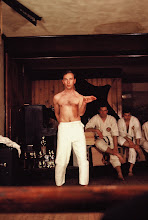Inner Training/Outer Training.
I remember a lesson my Sensei once taught me when I was about twelve or thirteen.
We had this sort of 'inner-circle' group of very serious people that I was about to be welcomed into, people in the group called it 'Warrior's Journey' and one of the books we had to read as part of the initial entrance was 'Way of the Peaceful Warrior' by Dan Millman.
At the time I didn't really understand it, but after so many years since then, things have really sunk in.
The lesson in question was about sweeping the floor. Bud Cook Sensei, the Chief Instructor of the Aikido Program at the Evergreen Learning Center was sweeping the Dojo floor, Sensei told me to go take the broom from him and sweep myself, to share the responsibility of Dojo cleaning, he compared it to Shoji, or Temple Cleaning in Zen Buddhist Temples.
I hesitated, I asked Cook Sensei if he would like me to do the sweeping, he said no and continued to sweep the floor, unsure of myself, I simply backed away, taking his word for it.
Sensei got up, took the broom from Cook Sensei and swept the floor in his place, I did not understand the meaning of the lesson at that time, I think I was a bit too young to understand the deeper aspects or the magnitude of the journey on which I was about to embark.
Karate, for me, had been more about tournaments and sport, something interesting to do after school and a group of friends to do it with.
Kata, at that time, was a dance used to gain points the way they do with forms in Gymnastics, and sparring was something completely different, neither one seemed to coincide, but again, I was too young to think twice about any of it.
That all changed very quickly, and it did not take long for me to begin to question the way things were done.
Now I realize the lesson behind sweeping the floor in Sensei's place. It was not about respecting their authority, although I am certain this was an aspect of it, but it was more about my hesitation to do so.
If I hesitated in grabbing the broom, how can I expect to respond quickly and effectively in other areas, whether they are fighting, working, or anything else.
It is about training the mind as much as training the body. If the mind is hesitant, uncertain, whatever the case may be, then it will reflect not only in Karate technique, but every other aspect of life as well.
You will not be able to land a powerful strike, you will not be able to execute an effective lock or escape or throw, your body will be broken, you will be out of harmony with yourself.
In other areas you might not perform well at your job, which will effect that next promotion or pay raise, it will effect how you drive a car, how you walk down the street, how you interact with others, even in the smallest way.
In training we not only seek to be effective Karateka, we seek to be effective human beings.
We seek to eliminate this sort of thing from every aspect of our lives, to delve into things with the ferocity, focus, and indomitable spirit of a warrior on a battlefield.
This, too, will reflect not only in our Karate, but in EVERY SINGLE ASPECT OF OUR LIVES.
These days this sort of thing seems to be overlooked in many schools, both traditional and non-traditional alike.
People think it is all physical, they work their muscles, they train their bodies hard, but neglect the internal aspect of training altogether. This is only half a Karateka.
There is a huge difference between a mere fighter and a Martial Artist, and that difference is in how much they train or do not train in the above aspect.
Subscribe to:
Post Comments (Atom)

No comments:
Post a Comment